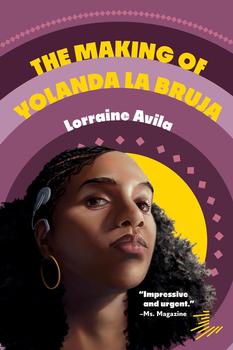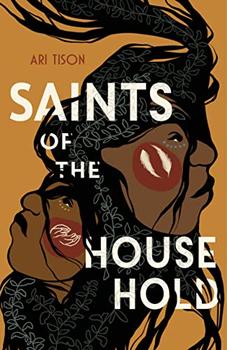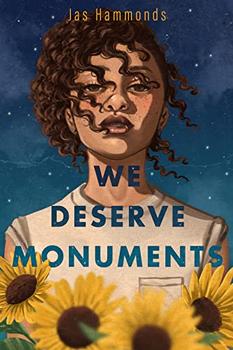Summary | Excerpt | Reviews | Beyond the book | Read-Alikes | Genres & Themes | Author Bio

Anyone can point to a moment in their life when they felt silenced. While thinking about such a moment, a person might wonder how speaking up could have changed the course of things. At the same time, we can't always be the masters of our destinies. The way our identities may intersect within marginalized cultures, ethnicities, races and neurodivergences can add to this feeling of silencing, bringing a sense of doubt and shame around speaking up and advocating for ourselves and others. So what can 16-year-old bruja-in-training (see Beyond the Book) Yolanda Alvarez do when she has a premonition that the new white kid Ben, the son of a local politician, is planning a school shooting? How can she figure out a way for others to trust in her visions when she doesn't trust them herself? Lorraine Avila's gut-wrenching young adult debut, The Making of Yolanda la Bruja, is a coming-of-age novel about finding one's voice through resisting oppression and celebrating lineage. It is equal parts devastating and cathartic. It creates space for bereavement, as well as for commemoration of all the parts that make up who we are.
For me, the defining piece of the book is Yolanda's immeasurable love for the people around her and her pride in her Dominican heritage. I enjoyed seeing her so loved and so comfortable being loved. She harbors no second-hand embarrassment for her parents and their flaws. She celebrates her womanhood, blackness and deafness. Her appreciation for herself and others extends to physicality and also spirituality. Everyone is loud and proud, casting no shame over anyone. Avila's novel shows the building and maintenance of a community that I quickly found comforting, even on the outskirts as a reader. I felt like I'd been swallowed into the embrace of Yolanda's world in the Bronx.
Yolanda is a character who stands out: She has an unapologetically opinionated personality, a wildly beautiful Afro and thick processors for her cochlear implants, which she is not afraid to remove in the company of the hearing world when she is feeling over it. Readers who would benefit from seeing a character who is different but fully exists in her environment, and is celebrated in it, will likely find comfort and a sense of belonging in this novel.
There were a few elements of the book that didn't meet my expectations, though this is partly because the jacket summary describes the narrative arc of the story differently than how it actually plays out. The description may lead readers to believe a major point of the plot hinges on whether Yolanda can convince people not only that she has visions but of what the visions entail: a premonition that Ben will shoot up the school. However, the conflict Yolanda encounters concerning her visions is internal and more about whether she believes in herself, as she seems too terrified to tell people about them in the first place. Nonetheless, I was fine with how the direction of the narrative steered. I appreciated Avila's focus on Yolanda's journey as a person — she juggles so much trauma while coming to terms with her evolving identity, even as someone who is already more confident and self-assured than most teenagers her age. The author's ability to weld a beautiful character into an even more impressive one over time makes the read rewarding.
I did feel there could have been more tension built around Ben and his Democratic politician father. In his campaign, Ben's father presents himself as an advocate for equality and a champion for human rights, but Ben believes "social justice is cancer" — there is a sociopolitical hypocrisy Avila points to in his family life. There is also some friction between Ben and his father, but Ben is predictable from start to finish. This wouldn't bother me as much if there were more indications of danger surrounding him throughout the narrative, beyond the frustrating white-boy microaggressions he shows at school and Yolanda's visions. I think he could have been built up more without being centered. The book is not necessarily about him but is somewhat about the abhorrent act of violence he could inflict on the people around him, which I honestly wasn't convinced he was capable of until late in the novel.
Overall, The Making of Yolanda la Bruja is a very intense read for young adult fiction, but it is a step in the right direction for this generation of young readers. It discusses speaking up for what you believe in, accepting who you are and nurturing yourself. This lesson is not only imperative for young people, but one that transcends age. It is a lesson we try to learn throughout our lives.
![]() This review
first ran in the May 3, 2023
issue of BookBrowse Recommends.
This review
first ran in the May 3, 2023
issue of BookBrowse Recommends.

If you liked The Making of Yolanda la Bruja, try these:

by Ari Tison
Published 2025
Saints of the Household is a haunting contemporary YA about an act of violence in a small-town - beautifully told by a debut Indigenous Costa Rican-American writer - that will take your breath away.

by Jas Hammonds
Published 2024
Family secrets, a swoon-worthy romance, and a slow-burn mystery collide in We Deserve Monuments, a YA debut from Jas Hammonds that explores how racial violence can ripple down through generations.
Dictators ride to and fro on tigers from which they dare not dismount. And the tigers are getting hungry.
Click Here to find out who said this, as well as discovering other famous literary quotes!
Your guide toexceptional books
BookBrowse seeks out and recommends the best in contemporary fiction and nonfiction—books that not only engage and entertain but also deepen our understanding of ourselves and the world around us.